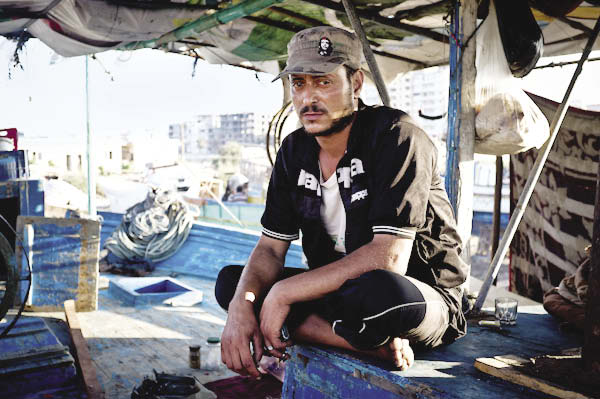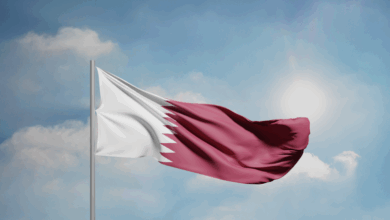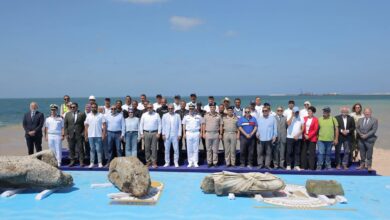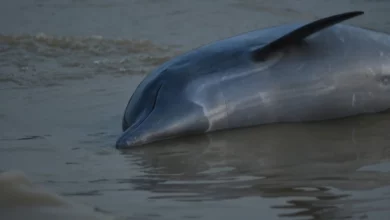
ALEXANDRIA — The microbus drops one off at the bustling Abu Qir fish market, where merchants display the fruits of fishermen’s labor — fresh revenue ranging from mullet to shrimp and tilapia. By night, a cafe frequented by fishermen becomes packed, as some take a rest before they set sail again.
Passing through a military checkpoint, smaller and bigger boats are lined up on the shore. New boats are being born here and old ones repaired, as the frequent sound of hammers landing on wood disrupts the otherwise serene town.
The residents of Abu Qir live off the sea, as most of them earn a living connected to fish one way or the other, be they fishermen, merchants or butchers. For generations, sons have inherited their fathers’ professions, taking to the sea at a very young age.
But a series of staunch regulations on fishing, coupled with an increasingly poor fish environment due to unregulated waste dumping and paralleled with the state offering no alternatives, has left many livelihoods under threat.
“If this goes on at this pace, I don’t know what our children will live on,” one fisherman says.
Enforcing some policies, neglecting others
Every year, a fishing ban is enforced for two months to allow the fish to reproduce. The sea would yield little to no revenue for the fishermen all year if this policy were not enforced. The fishermen are in no way compensated for the losses that accrue from this ban, forcing some to ignore this policy altogether and illegally take to the sea.
This renders the fishing ban self-defeating; while it purports to be in the best interest of the fishermen, it simultaneously adds to their economic hardship in the absence of an alternative.
“Do anything to a fisherman — take an arm, a leg, but do not deprive him of the sea, otherwise give us a viable alternative,” says Abdo Hussein, a merchant in the village.
Shaaban Abdel Maqsud, a 30-year-old fisherman, voices a similar complaint.
“I have been on and off boats since I was 4, do you expect me to take a job as an engineer or a doctor for these two months?” he asks.
Another such policy relates to the poisonous crayfish, the harvest of which is banned for health concerns.
“The crayfish eats everything that comes in its path, even our nets, eating away our profits,” Hussein complains. He adds that the crayfish, seen by fishermen for the first time only a few years ago, multiplies fast because they are not allowed to harvest it.
Likewise, this policy is not counterbalanced with initiatives to alleviate losses suffered. “Then at least initiate a project to do something about it, get it out of the sea,” Hussein says.
For the fishermen of Abu Qir, the above are not the biggest concerns. The scarcity of fish on the Mediterranean coast has been particularly harmful. Chemical waste disposed by nearby fertilizer and oil plants in the Abu Qir Bay poisons the water, killing or poisoning what revenue is left for the fishermen.
Nearly all fishermen Egypt Independent spoke to lament this pollution, their account being consistent with a report published by the Land Center for Human Rights, an Egyptian NGO advocating the rights of workers, farmers and fishermen.
Ahmed al-Saad, who is a member of the center’s research team, is resolute.
“There is no doubt that the dumping of chemical waste in Idku Lake and the Mediterranean Sea around Abu Qir Bay is one of the major reasons why there are no fish. This has brought the fishermen’s standards of living below zero. We are talking about the Rakta Paper Company and the Abu Qir Fertilizer and Liquefied Gas companies,” Saad says.
Saad goes on to say that this has affected the fishermen of Abu Qir, Idku, Rashid and other places.
“Pollution became especially bad 10 years ago and has been increasing year by year ever since,” he says.
The Land Center for Human Rights report further said the amounts of chemical waste disposed of in the area far exceed what is allowed by law. In addition, residents of the affected areas run health risks due to the consumption of poisoned fish. The government has yet to intervene and enforce this law.
But Mohamed Shabaan, head of Central Department at the General Authority for Fish Resources Development — part of the Agriculture Ministry — says the problem lies primarily with the violation of the fishing ban.
“The foremost reason the sea is empty of fish is the fishermen’s lack of awareness. They refuse to observe the fishing ban, thus harming themselves. They don’t do this because they are poor, but because they are after a quick profit,” Shabaan says.
He says the fishing ban is not a surprise — fishermen know about it and can save up all year, or get another job during that time.
“They are not as poor as they would like you to believe — they’re sitting in cafes half of the time,” Shaaban adds.
On-the-ground solutions
Captain Rashad Yaqub Qutb, who unsuccessfully ran for a seat in Parliament on a fishermen-based program, says the retirement age had been one of the first points he intended to tackle.
“This is an extremely hard profession physically. A fisherman’s body is completely worn out by the time he reaches the age of 50,” Qutb says.
Currently, fishermen can retire at the age of 65, receiving a pension of LE120–150 per month.
“We don’t become much older than that,” he says cynically, suggesting lowering the retirement age to 55.
“We all know of the many crises in Egypt. What does this meager salary buy you nowadays?” asks 71-year-old retired fisherman Ali Ibrahim Ahmed. “We want free health insurance for all. Most fishermen can’t pay for medicine and treatment, and have to depend on the generosity of others if they fall ill.”
The points addressed on the leaflet Qutb distributed during the parliamentary elections resemble the grievances of many of the fishermen who talked to Egypt Independent. Besides addressing all the above problems, the points include establishing an independent fishermen’s syndicate.
“We are currently not represented in any institution,” Qutb said. He pointed out that Egypt’s long coastlines are home to millions of fishermen and their families. “Do you realize how much power we have with those numbers? Surely we can push Parliament to meet our demands if we unite.”
In-the-water solutions
Given their location on the Mediterranean coast, Abu Qir and Rashid have been the point of departure for migrants from Egypt and sub-Saharan countries seeking better opportunities elsewhere. With mounting economic pressure looming over this community, some see an alternative source of income in facilitating undocumented migration.
Fishermen have thus guided a dangerous amount of migrants packed on boats across the Mediterranean, despite the possibility of perishing at sea before reaching the intended Italian shores.
“As long as you don’t give us an alternative, expect this to continue,” says one fisherman, who spoke on the condition of anonymity.
Some residents say the last time that boats of migrants departed from Abu Qir was a year ago, while others give conflicting reports. It is not possible to verify how often these boats leave Egyptian shores.
But migrants will increasingly resort to Egyptian shores, says David Lagarde, researcher for Migreurop, a network of associations monitoring European Union policies on migration.
Lagarde says this is because the options of Morocco, Libya and Tunisia have been blocked by agreements between the EU and respective countries or operations of Frontex, the European agency controlling the external borders of Europe. In addition, Libya has signed bilateral agreements with Italy aimed at curbing irregular migration.
“All they did is move the point of departure eastward to Egypt, making the journey longer and thus more dangerous. This has led to an increase in deaths in the Mediterranean,” Lagarde says.
Shaaban has come out strongly emphasizing the need to reprimand fishermen for such practices. “They should be tracked down and punished. We should ban them from fishing for six months if they do this once. The second time, we should permanently take away their fishing license. The General Authority for Fish Resources Development is purchasing four boats to police the seas — two for the Red Sea and two for the Mediterranean.”
In the meantime, the Abu Qir coast is a military zone, with the watchful eye of the Armed Forces seeing to it that every boat is scrutinized. This is in line with the pattern that is all too familiar to the residents of Abu Qir; some policies are enforced, others are not.
This piece was originally published in Egypt Independent's weekly print edition.




